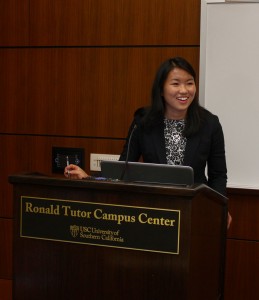Organizations host panel on sexual assault
The ongoing issue of sexual assault policy at USC was the topic of discussion for a panel discussion that took place Wednesday evening.

Opening a dialogue · Jenny Di, president and founder of the Roosevelt Institute at USC, moderated the panel discussion with student and administrative leaders on campus. – Jessica Zhou | Daily Trojan
Panelists included Jody Shipper, USC’s Title IX Coordinator; Ekta Kumar, director of the Center for Women and Men; Shyann Murphy, co-executive director of the Women’s Student Assembly; Rini Sampath, Undergraduate Student Government vice president; Francesca Bessey, USG assistant director of Wellness Affairs; and Karina Eileraas, visiting professor of gender studies.
The Roosevelt Institute, a newly established organization on campus, organized the discussion. The Roosevelt Institute’s main goal is to promote conversations among students and administration. They contacted student and administrative leaders involved in sexual assault policy and invited them to attend as panelists.
“They approached us recently after we launched the Trojans Respect Consent page just two weeks ago,” Sampath said. “Since then that page has already gained 1,100 likes on Facebook and I think we really caught the attention of students on campus who are also working hard to combat sexual violence.”
Panelist Francesca Bessey was one of the students who created the Student Coalition Against Rape group at USC in Spring 2013. She hoped the panel would be an open conversation about sexual assault.
“Often when I say the word rape in a room, I see people flinch,” Bessey said. “That’s a really big problem because I’ve never heard of something we’ve been able to solve without being able to talk about it openly.”
Jenny Di, president and founder of the Roosevelt Institute, moderated the discussion. After introductions of each member’s experience and background with sexual assault policy, the panel was asked what actions are being taken by each of their departments or groups to address the issue.
“There has been ongoing training behind the scenes for administrators, DPS, those who handle sexual assault and those who might be the first to receive information about sexual assault,” Shipper said.
Efforts to raise awareness about sexual assault policy among the student body was also a point of discussion.
“We’re trying to promote the fact that this is not about talking to the same students who already know how to help others,” Sampath said. “We want every student at USC thinking about how to help others through bystander intervention and how we can change the culture on campus.”
The new California Affirmative Consent or “yes means yes” law and misconceptions surrounding it were also discussed.
“I think one of the most vocalized critiques of this legislation has been that people assume this will now create an atmosphere of panic where there has to be a vocalized consent,” Eileraas said. “So there is a fear that this will lead to a flurry of false rape accusations.”
Lena Melillo, director of the Take Back the Week Event for the Women’s Student Assembly, attended the event.
“I’m interested in Women’s Student Assembly teaming up with other organizations on campus because of the problems they brought up of it being a very fragmented activism,” she said. “There’s so many different organizations working on the same thing that it would be a lot stronger if all of them came together.”

